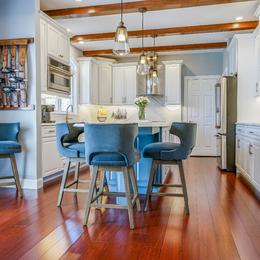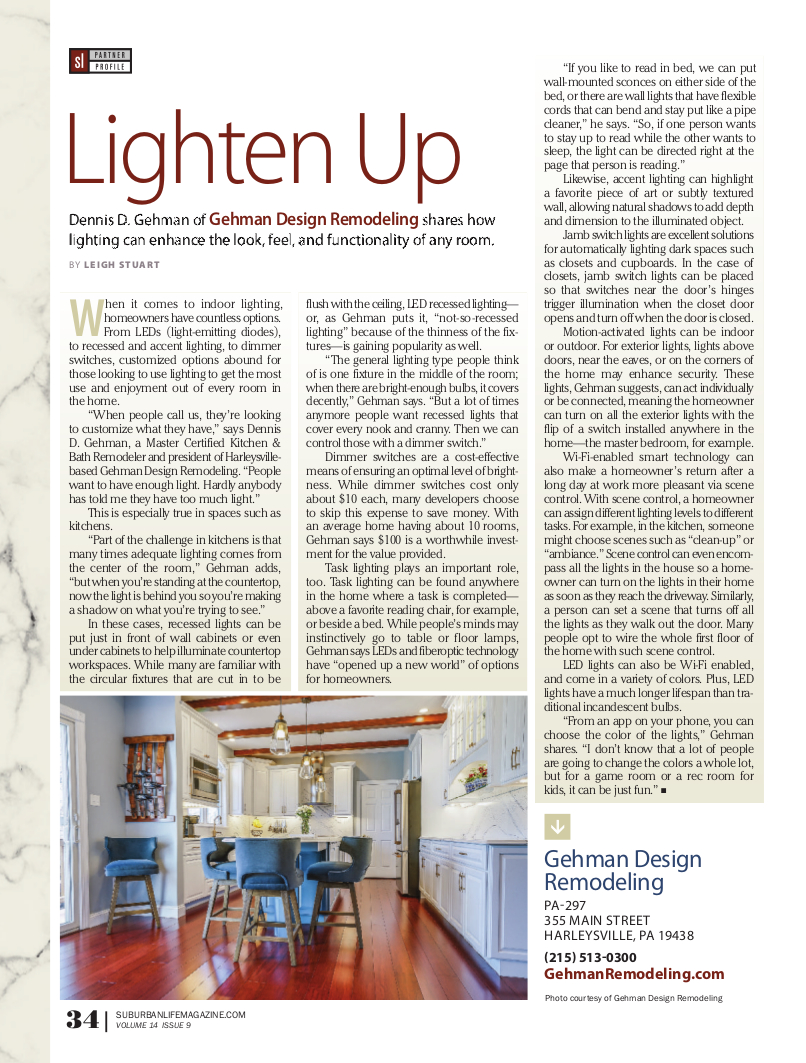
Lighten Up
Dennis D. Gehman of Gehman Design Remodeling shares how lighting can enhance the look, feel, and functionality of any room.
When it comes to indoor lighting, homeowners have countless options. From LEDs (light-emitting diodes), to recessed and accent lighting, to dimmer switches, customized options abound for those looking to use lighting to get the most use and enjoyment out of every room in the home.
“When people call us, they’re looking to customize what they have,” says Dennis D. Gehman, a Master Certified Kitchen & Bath Remodeler and president of Harleysville-based Gehman Design Remodeling. “People want to have enough light. Hardly anybody has told me they have too much light.”
This is especially true in spaces such as kitchens.
“Part of the challenge in kitchens is that many times adequate lighting comes from the center of the room,” Gehman adds, “but when you’re standing at the countertop, now the light is behind you so you’re making a shadow on what you’re trying to see.”
In these cases, recessed lights can be put just in front of wall cabinets or even under cabinets to help illuminate countertop workspaces. While many are familiar with the circular fixtures that are cut in to be flush with the ceiling, LED recessed lighting—or, as Gehman puts it, “not-so-recessed lighting” because of the thinness of the fixtures—is gaining popularity as well.
“The general lighting type people think of is one fixture in the middle of the room; when there are bright-enough bulbs, it covers decently,” Gehman says. “But a lot of times anymore people want recessed lights that cover every nook and cranny. Then we can control those with a dimmer switch.”
Dimmer switches are a cost-effective means of ensuring an optimal level of brightness. While dimmer switches cost only about $10 each, many developers choose to skip this expense to save money. With an average home having about 10 rooms, Gehman says $100 is a worthwhile investment for the value provided.
Task lighting plays an important role, too. Task lighting can be found anywhere in the home where a task is completed—above a favorite reading chair, for example, or beside a bed. While people’s minds may instinctively go to table or floor lamps, Gehman says LEDs and fiberoptic technology have “opened up a new world” of options for homeowners.
“If you like to read in bed, we can put wall-mounted sconces on either side of the bed, or there are wall lights that have flexible cords that can bend and stay put like a pipe cleaner,” he says. “So, if one person wants to stay up to read while the other wants to sleep, the light can be directed right at the page that person is reading.”
Likewise, accent lighting can highlight a favorite piece of art or subtly textured wall, allowing natural shadows to add depth and dimension to the illuminated object.
Jamb switch lights are excellent solutions for automatically lighting dark spaces such as closets and cupboards. In the case of closets, jamb switch lights can be placed so that switches near the door’s hinges trigger illumination when the closet door opens and turn off when the door is closed.
Motion-activated lights can be indoor or outdoor. For exterior lights, lights above doors, near the eaves, or on the corners of the home may enhance security. These lights, Gehman suggests, can act individually or be connected, meaning the homeowner can turn on all the exterior lights with the flip of a switch installed anywhere in the home—the master bedroom, for example.
Wi-Fi-enabled smart technology can also make a homeowner’s return after a long day at work more pleasant via scene control. With scene control, a homeowner can assign different lighting levels to different tasks. For example, in the kitchen, someone might choose scenes such as “clean-up” or “ambiance.” Scene control can even encompass all the lights in the house so a homeowner can turn on the lights in their home as soon as they reach the driveway. Similarly, a person can set a scene that turns off all the lights as they walk out the door. Many people opt to wire the whole first floor of the home with such scene control.
LED lights can also be Wi-Fi enabled, and come in a variety of colors. Plus, LED lights have a much longer lifespan than traditional incandescent bulbs.
“From an app on your phone, you can choose the color of the lights,” Gehman shares. “I don’t know that a lot of people are going to change the colors a whole lot, but for a game room or a rec room for kids, it can be just fun.”
Gehman Design Remodeling
PA-297
355 Main Street
Harleysville, PA 19438
(215) 513-0300
PA-297
355 Main Street
Harleysville, PA 19438
(215) 513-0300
Photo courtesy of Gehman Design Remodeling
Published (and copyrighted) in Suburban Life magazine, May 2023.



